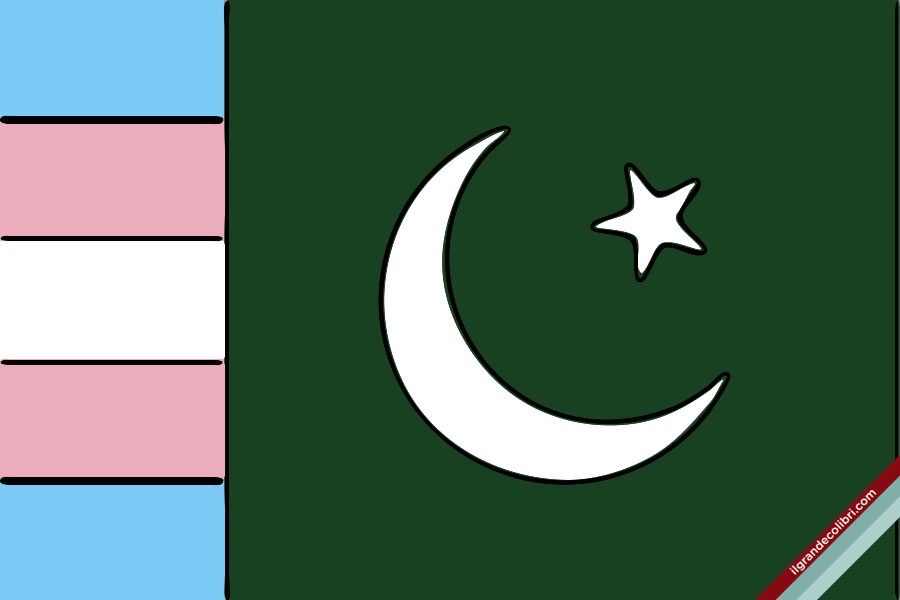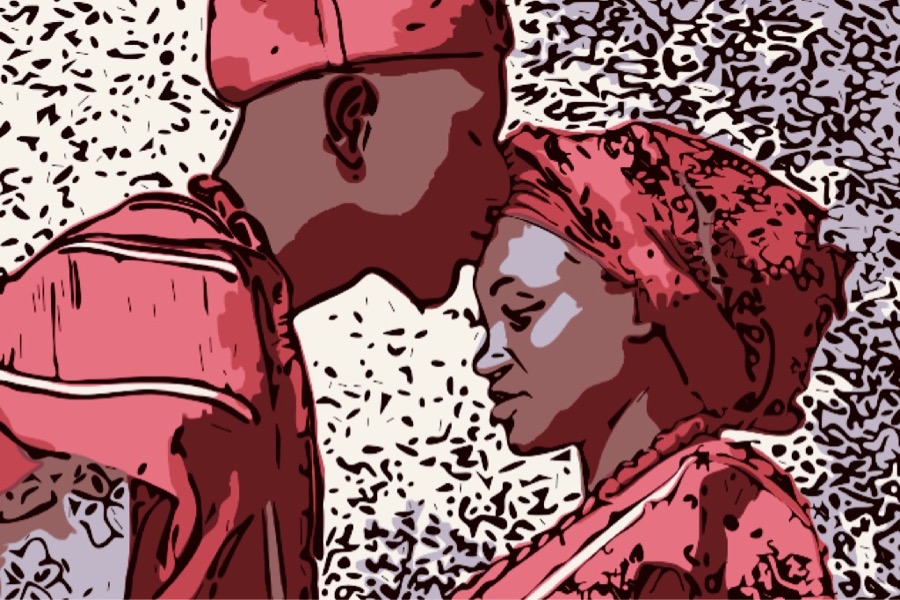Not so long ago, the term transgender was considered an alien word by the majority of the Pakistani population. Those who were somehow familiar with this term knew it because of the ancient khawaja sira culture that has existed in the subcontinent for centuries. The real issue with this khawaja sira term is that it was a management designation in Mughal seraglio, which was given to chief male eunuchs who were responsible for various management tasks in the harem.
Those eunuchs deployed in the harem were considered men, such as a Malik Kafur – who was a prominent slave-general of the Delhi sultanate ruler Alauddin Khalji – remembered as a castrated man by historians and not as a transgender woman. How these khawaja siras used to end up in harems after being castrated is debatable by historians, as few believe that these khawaja siras were young slave boys who were forcefully castrated to get trained for Mughal harems. However, very few believe that they willingly castrated themselves to get high positions within the harem staff.
After the downfall of the Mughal Empire, the designation of the term khawaja sira (which was originally meant to describe eunuchs) started to get more largely used to address transgender women and non-binary people. Just like in the modern days, transgender and non-binary people were vulnerable to prosecution under colonial law, so they all started gathering up and thus the term khawaja sira – from being an important historic designation – became a legit cultural identity. Later on the word khawaja sira eventually became an unofficial generic term for anyone identifying as a transgender person in Pakistan.
Despite the awareness regarding this term, the majority of the transgender people are still called with disrespectful terms, such as khusra (impotent). Even today the term khusra is widely used while the word khawaja sira is used as an alternative only when it comes to showing respect.
The contemporary transgender broader umbrella, however, does not get satisfied with the term khawaja sira as an authentic Urdu translation for the word transgender. The reason is that from time to time there are many transgender men and women (including transsexual people) who identify themselves with binary genders and do not belong to khawaja sira culture. Indeed, they have disassociated themselves with this ancient culture and identity.
Up till very recently, there wasn’t any particular term for transgender men and women in the Urdu language, however, the recently established term mutajannis is gaining popularity amongst transgender people and their allies in Pakistan. This particular word brings everyone under the definition of the contemporary transgender umbrella, but further gender classifications remain unnamed in Urdu language.
Ever since the historic Transgender Person Act 2018 was passed by the Pakistani government, there was a ray of hope for every transgender person, and it was celebrated as a victory. But the real battle was yet to begin as the sensitization, awareness, and identification of various transgender identities were yet to be established. After the approval of the law, the first step should have been the issuance of national identity cards on self-perceived gender (as per law), but this turned out to be the biggest challenge.

Khursand Bayar Ali
The National Database and Registration Authority (NADRA), which is responsible for issuing the identification documentation to every Pakistani, turned out to be poorly aware of this. Khursand Bayar Ali, a well-known transgender activist from Lahore, said that getting an “X” gender identity card from NADRA requires only a few steps. One just needs to go to the nearest NADRA office and to get the “X” gender national identity card without any hurdle. However, the real battle starts when a transgender person (identifying with binary gender) wants to get either a male or a female identity card.
Khursand said that NADRA officials demand various kinds of medical documents to process the request, which include gender assessment forms and sex verification certificate. This is a clear violation of the law stating any Pakistani citizen can have identification documents based on the gender of their own choice.
 Surprisingly, the issuance of the “X” gender does not require any kind of gender or sex verification certificate. The attitude behind this behavior can be found in the same social mindset that was excluding transgender people from mainstream society. Many transgender people struggle all their lives to be accepted with a binary gender, but the society keeps rejecting them, and (despite the availability of the law) the same behavior exists in NADRA officials too.
Surprisingly, the issuance of the “X” gender does not require any kind of gender or sex verification certificate. The attitude behind this behavior can be found in the same social mindset that was excluding transgender people from mainstream society. Many transgender people struggle all their lives to be accepted with a binary gender, but the society keeps rejecting them, and (despite the availability of the law) the same behavior exists in NADRA officials too.
The response of this particular government body (NADRA) is clearly discriminatory, as it puts one kind of transgender people into a privileged zone and others into deprivation. Considering this, the majority of transgender people – and particularly transgender women (not belonging to khawaja sira culture) and transgender men – do not prefer to get into “trouble” when applying for a new identity card. As the majority of non-khawaja sira transgender people come from privileged social classes, they do not wish to be in any unnecessary limelight. Despite all this, a lot have managed to get new identity documentation with binary genders but complained about the horrible and discriminatory responses by the issuance authority.
Khursand strongly believes that the behavior of government bodies is full of ignorance. She recommends sensitization and awareness regarding the law on the grass-root level in every government organization. If transgender people keep facing hurdles at the very first step of their recognition, how will they move on to other legal affairs? The law allows every Pakistani transgender citizen to choose amongst “X”, “M” or “F” genders, but issuance authority maintains hurdles in the process.
Pakistan is an evolving society, and it has shown a drastic change in the past few years towards certain social taboos. Moon Ali, a well-known transgender activist and also director of programs for Khawaja Sira Society (a reputed and pioneer organization for the welfare of transgender people) has high hopes in the youth of Pakistan. During an interview conducted by Il Grande Colibrì, she has shown positive confidence towards the youth which is 70% of the entire country’s population. It is true that behaviors are easily editable in millennials, but this requires sensitization on a large scale.
Moon Ali recommends that gender-related information should be part of the educational curriculum. Only by doing this, we can educate this 70% portion of the society which eventually will run the country one day. At the same time, the media and NGO sectors have a huge responsibility as well. The different definitions of gender and how to comprehend them have to be spread through the media.
Moon says the success stories of transgender people (the ones that have been accepted by families and have achieved a respectable position in society) should be promoted extensively through media. Also, NGOs should play their role in spreading such kind of positivity. Besides this, Pakistani society also needs to be aware of the consequences of family rejection and abandonment towards transgender people. The society should know both of the positive and negative sides, and then decide which side they want to stand for.
Moon Ali is aware of the concerns in the educational institutions and corporations, and the reasons why transgender people are usually denied job opportunities and admissions. She has been working on capacity building and training transgender people on various skills. Only recently Pakistani society has started mingling up with transgender people, particularly those belonging to the khawaja sira culture, and for ages both have been evolving in different ways with different norms and values.

Moon Ali
The middle grounds for both the transgender community and mainstream society are yet to be defined where both can feel no differences between each other. This inclusion can only take place when the majority (mainstream society) will take steps forward to embrace transgender people in itself. Moon Ali emphasizes on religious clerics and government bodies to step up in minimizing discrimination based on gender. Inclusion will take place when both of them will step forward and come out of the rigid school of thoughts about each other and accept each other’s values, norms, etiquettes, and behaviors.
Pakistan is still in a dark era when it comes to medical, surgical, and health matters of transgender people. It is not that procedures like orchiectomy and implants for transgender women or mastectomy and hysterectomy for transgender men have never been done, they have been practiced for a long time, but only in the black surgical market by incompetent doctors.
The recent trends in minor transitioning procedures, such as hormone replacement therapy, laser hair removals (and other basic procedures), are also in the hands of medical quacks, who are continuously playing with transgender people’s lives. The Transgender Protection Act 2018 made the government’s liability provide to transgender people medical and health-related facilities.

Despite this, the Pakistan Medical and Dental Council remains in delusion regarding transgender health issues and procedures. Iran, a strict Islamic country, provides interest-free financial loans to transgender people to complete their transition from one gender to another. But the same kind of attitude lacks in Pakistan. Thailand is the world’s hub for gender correction surgeries and Iran comes second in a row, but despite the law and examples of neighboring countries, the health sector is inactive to provide health facilities to transgender people.
Dr. Sana Yasir, a physician and intersex educator in Karachi, says that the health care providers have considered gender dysphoria and gender identity disorder the same thing also by using the same terminology until nowadays. Whereas society is largely influenced by Islam, which considers having sex-corrective surgeries an un-Islamic act. Also, few of the surgeons who are aware of transitioning procedures do not advertise it as they believe that, for the most part, the transgender population is underprivileged and may not be able to afford it. Although the same kind of surgeries are happening on intersex infants, which is again a clear violation of a United Nations’ verdict.
Dr. Sana Yasir is trying to organize a session for Pakistani surgeons by Dr. Marci Lee Bowers, who is an American gynecologist and an expert on gender confirmation surgeries and who has conducted thousands of this kind of surgeries. Dr. Sana believes that such kind of seminars and training sessions by foreign doctors will raise the awareness of Pakistani doctors towards these various surgical procedures involved in transitioning from one gender to another.

Dr. Sana Yasir
Dr. Sana Yasir also runs the project “Leap for Intersex” which is raising awareness on safe transitioning procedures and steps involved in it. She confirms that a lot of Pakistani doctors have shown interest in learning more about gender confirmation procedures (vaginoplasty for transwomen and phalloplasty for transmen). Despite all this, the term sex change raises a lot of eyebrows in Pakistani society.
Many do not understand this concept because of the poorly awareness, plus, there is no contemporary verdict from prominent religious clerics and the term itself is still considered taboo. The lack of awareness and the fear of being mishandled also keeps a lot of transgender people away from such surgical steps. However, Dr. Sana Yasir is consistent and confident to erase this stigma and change the mindset of Pakistani health care providers, bringing a positive change in general behavior towards gender confirmation surgeries in Pakistan.
Even though the transgender population is considered as the most privileged amongst gender and sexual minorities, the rate of violence towards them and the number of murders is at an all-time high. Transgender men and women get harassed, and get physically and mentally abused by their own families, and are threatened to serious consequences for revealing their true gender identity. Those who join khawaja sira culture are more vulnerable because usually they end up being involved in begging, wedding dancing, and sex work.
Reem Sharif, a transgender rights advocate, states that, because of the involvement in such kind of dark professions, transgender women have no respect in patriarchal and religious-minded Pakistani society. Begging and sex work are crimes in Pakistan. The transgender protection law is being implemented at an extremely low rate and this has created more uncertainty in the society regarding transgender people. Also, the behavior of law enforcement agencies throughout the country is really disappointing towards transgender people, particularly those belonging to the khawaja sira culture.

Reem Sharif
Reem Sharif says that such kind of late response from law enforcement agencies towards ongoing atrocities on transgender people has put criminals into a more fearless state. It is illegal to abuse and mistreat transgender people at any public or private space, or deprive them of their inheritance share, but this is what every transgender person complains in his or her daily routine. A program for transgender people by the name “Tahafuz” has been launched by the Rawalpindi police to provide access to law, but these kinds of initiatives can change society only if every police station in Pakistan executes the same program. Reem knows that electronics and social media play a vital role in creating awareness on different transgender identities and their rights.
She also puts an emphasis on transgender women, particularly those who belong to the khawaja sira culture, to claim their due respect in the society and for that she wants them to leave professions like begging, sex work, and wedding dances. She understands that their survival might be difficult without being involved in these ill-famed professions, but that’s the sacrifice one has to make to earn respect. It is better to earn less but respectfully than to earn lavishly through illegitimate activities. Once mainstream society will see transgender men and women working in different sectors, their perception will automatically change.
Islam is the most dominant religion in Pakistan, and Sunni sect is the majority. The neighboring country Iran has addressed a lot of contemporary issues ever since the Islamic revolution took control. One of the most discussed fatwa by Ayatollah Khomeini was when he permitted gender confirmation surgery to a transgender woman named Maryam Khatoon Molkara.
The Iranian Shia clerics explain transsexual surgical procedures as a cure to the problem, by justifying that the basic humanity of the person is preserved whereas the change is simply of characteristics. There is no verse in the Quran which addresses transsexual issues. Hence, considering it as a contemporary problem, the allowance of sex correction surgeries was made legal all around the country in the 1980s.

Maryam Khatoon Molkara and Mohammed
Unfortunately, the Sunni majority in Pakistan either do not discuss this or they consider it haram, while the Pakistani Shia clerics and Shia population in Pakistan remain ignorant on Imam Khomeini’s fatwa on transsexuality. Maryam passed away in 2012, but she left a legacy through which hundreds of transsexual people benefit each year in Iran. The Iranian government supports transgender persons in all transition expenses, and they are given new identification cards and birth certificates immediately after gender confirmation procedures are done.
There is no concept of the third gender in Shia Islam, while in Sunni Islam it is highly debatable. Considering this, the majority of Arab countries do not allow entry of third gendered people inside their borders. However, Shia Islam does accept the possibility of transfer from one gender to the other, if one remains binary. Maryam Khatoon Molkara went through all the surgical procedures at the expense of the Iranian government and eventually got married in Tehran with a government officer, Mohammed. But at the same time, a transsexual person getting married in Pakistan became a nightmare.
A transsexual man named Ali Akash got married in Wah Cantt in the start of 2020. He started his transitioning in 2019 and went through all basic surgical procedures before he applied for a male identity card. According to the Transgender Person Act 2018, he was authorized to get it. Afterward, he got married to a girl named Neha, and that is when one of Neha’s family members filed a case against Ali. As per the allegation in the case, Ali was mispresented as a woman and his marriage was claimed unlawful. No one spoke in favor of Ali and stepped ahead to help him. His own lawyer backed out as he was not aware of the transgender law. Media played the worst role, even BBC Urdu kept promoting the news as “Marriage between two women”.

Ali Akash
No religious cleric, neither Shia nor Sunni, stood up to explain the situation according to the Islamic context. Even the Human Rights Commission of Pakistan, which has apparently been a strong proponent of transgender rights, didn’t utter a word in favor of Ali. Ali was forced to go for chromosomal tests and sex verification tests. The judge and opposition lawyers kept making degrading remarks on Ali’s gender and doubted his gender on every hearing of the court. Ali fought in the start and explained his status on media, but eventually divorced his wife and ran away to avoid further trouble.
Transgender men remains the most unheard gender minority in Pakistan with very little visibility. Aun Shahid is a transgender man from Lahore, an activist and also an academic person. He shows quite a relief on the availability of Transgender Person Act 2018 and considers it a tremendous victory. Aun explains that the word gender has played an important role to free sexuality from its biological fetters.
The law in Pakistan allows you to choose a self-perceived gender that goes beyond the norms set in a patriarchal society. Although there is a long journey to be made in the implementation of this law, at the same time there are loopholes in the interpretation of various clauses in this act. Aun says that Pakistani society at large considers transgender women as men by looking at them through the lens of failed masculinity.
He says that there is a myth in Pakistani society that all members of khawaja sira community are intersex people. While growing up, Aun was told that those who do not fit into male or female categories are those who have some kind of “physical disability.” But the same perception stays in the society where khawaja sira people are mixed with intersex people. This myth has only given a miserable status and acceptance based on sympathy to people belonging to the khawaja sira culture and it has also created confusion and identity crisis between khawaja sira people and transgender men and women.

Aun Shahid
This is where the society needs to be aware of the fact that khawaja sira is a transgender culture and not an Urdu translation for the term transgender. The media, the government officials, and the society (for the most part) use the term khawaja sira for everyone identifying as transgender. Aun is confident that more media advocacy will change the transgender perception in society. Once we have learned various meanings and definitions of transgender people, only then we can fight for transgender marriage rights.
Aun shows no hope for transgender people getting married in Pakistan anytime sooner, even though it is the worst violation of human rights, but considering what happened to Ali Akash and his wife, Aun is highly disappointed. Each and every clause of the Transgender Person Act 2018 went through the scrutiny of the Council of Islamic Ideology, but despite that Ali Akash’s case was handled in a way that ended up creating an extremely bad precedent. Aun is desperate to create awareness on what self-perceived gender really means and how the government bodies and law enforcement agencies need to sensitize themselves. The journey seems long, but there is light at the end of the tunnel.
What we perceive from the current scenario is that there is a huge gap between mainstream society and the transgender population. Society at large considers transgender people as physically disabled or mentally challenged, and the difference between gender and sex is always misunderstood. Usually, when someone comes out as transgender, the main reason for rejection by family and society is because sex and gender are always considered being aligned.
The khawaja sira culture has been the only hope for many transgender women, the majority is involved in sex work, and having links with notorious people have made a lot of transgender people back out, but at the same time, many transgender women would still want to embrace this historic culture as they have no other choice. The origins of this culture were based on spirituality, but slowly it has become a counterculture phenomenon in Pakistani society with its own norms and values, thus alienating the transgender people. Transgender women in Pakistan need to appreciate their centuries-old existence through the khawaja sira culture, rather than using it as clutches to justify their existence in today’s world.
The Transgender Person Act 2018 gives hope to all types of transgender people, but without the implementation of every clause and the commitment of the government, the media, the NGO sector, and the educational institutes playing their role in all this, the circumstances will never change. Transgender people getting an education, working on high positions, getting married, and socializing openly should not be considered as an “out of the world” news and should not be given unnecessary coverage. This is how the real inclusion will take place when mainstream society will start giving transgender people the privilege to have the same gender identities as they do, the same social commitments as they make, and the same kind of relations they get into.
Without the right to transition and without the right to get married, the notion of transgender people will remain wretched in Pakistan. United Nations sustainable development goals 2030 (UNSDG) clearly define achieving gender equality as one of the main objectives. If a kind of gender identity is deprived of any kind of basic human rights, Pakistan will not be able to achieve the inspired goals.
Il Grande Colibrì
with the contribution of Tiznik
©2020 Il Grande Colibrì
images: Il Grande Colibrì




